Mitigate Pain Clinic – Dr Jeshnu Tople – Pain Management Specialist In Nagpur
Postherpetic Neuralgia
Postherpetic Neuralgia

What is Post-Herpetic Neuralgia (PHN)?
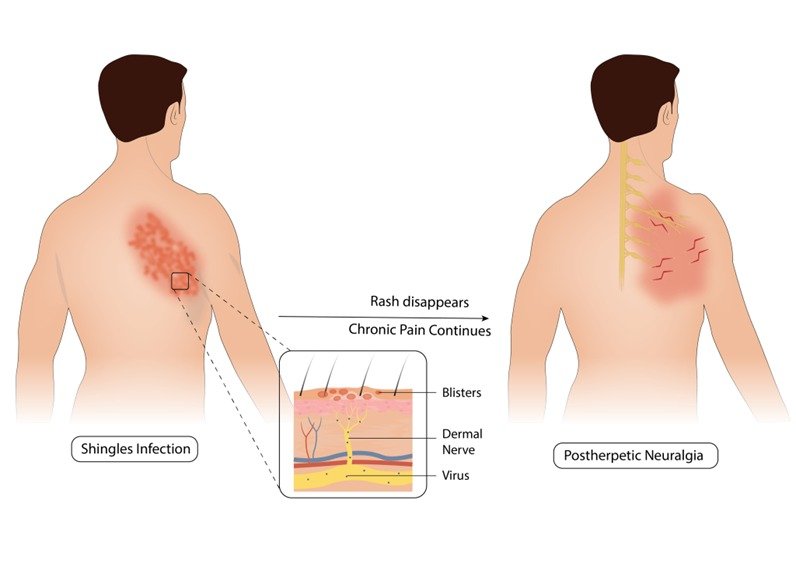
Causes of Post-Herpetic Neuralgia
PHN is caused by nerve damage resulting from the shingles virus (herpes zoster). When the varicella-zoster virus reactivates after lying dormant in the body (often many years after an initial chickenpox infection), it can cause inflammation and damage to nerve fibers. This nerve damage interferes with the normal communication between nerves and the brain, leading to chronic pain even after the skin lesions heal.
The risk factors for developing PHN include:
- Age (those over 60 are more prone to PHN)
- Severity of the shingles outbreak
- Delayed treatment for shingles
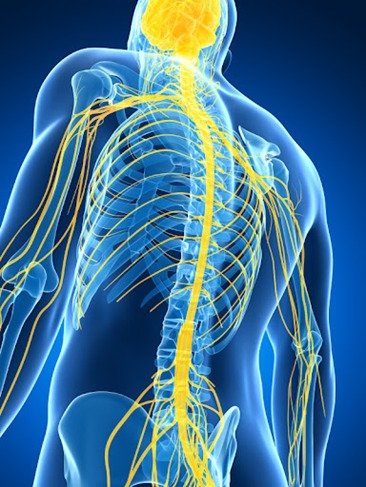
Symptoms of Post-Herpetic Neuralgia
PHN symptoms are typically localized to the area where the shingles rash occurred and can include a variety of sensations:
Burning pain: A persistent, deep burning sensation.
Sharp, jabbing pain: Intense, sudden pain in the affected area.
Allodynia: Sensitivity to light touch or mild pressure that causes pain.
Itching and numbness: Some patients experience an uncomfortable tingling or numb feeling.
Skin sensitivity: The skin in the affected area may become extremely sensitive to temperature changes or touch.
How Long Does Post-Herpetic Neuralgia Pain Last?
The duration of PHN varies from person to person. In some cases, the pain may resolve within a few months, while others may experience chronic pain for years. The pain associated with PHN can significantly impact a patient’s quality of life, disrupting sleep, daily activities, and mental well-being.
Early intervention with proper treatment can reduce the duration and severity of PHN. At Mitigate Pain Clinic, we focus on providing timely, effective treatments to minimize long-term suffering.
The Impact of PHN on Quality of Life
Living with PHN can be physically and emotionally challenging. The constant pain can lead to sleep disturbances, fatigue, and a reduced ability to perform everyday tasks. Many patients also report feelings of frustration, depression, and anxiety as a result of their chronic pain. This highlights the importance of comprehensive pain management that not only addresses physical symptoms but also offers support for mental and emotional well-being.
How Mitigate Pain Clinic Can Help
At Mitigate Pain Clinic, our team of experts specializes in interventional pain management techniques to help patients effectively manage the pain caused by PHN. Our goal is to reduce or eliminate pain, improve function, and enhance overall quality of life.
Our goal is to reduce or eliminate pain, improve function, and enhance overall quality of life.
Our comprehensive approach combines advanced treatments with compassionate care to tailor a treatment plan that best suits each patient’s needs. With cutting-edge technology and evidence-based practices, we offer a range of solutions to help patients regain control of their lives.
Interventional Pain Management for PHN
Interventional pain management techniques are at the forefront of treating PHN, providing relief when medications and other treatments fall short. These minimally invasive procedures target the source of the pain and work by disrupting pain signals before they reach the brain.
Some of the key interventional treatments available at Mitigate Pain Clinic include:
Nerve Blocks for Post-Herpetic Neuralgia
Nerve blocks involve injecting anesthetics with or without steroids directly into the area surrounding the affected nerves. This treatment helps reduce inflammation and block the transmission of pain signals. Nerve blocks can provide immediate relief, and repeated treatments may offer longer-lasting benefits.
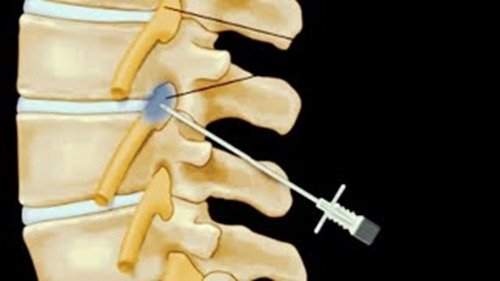
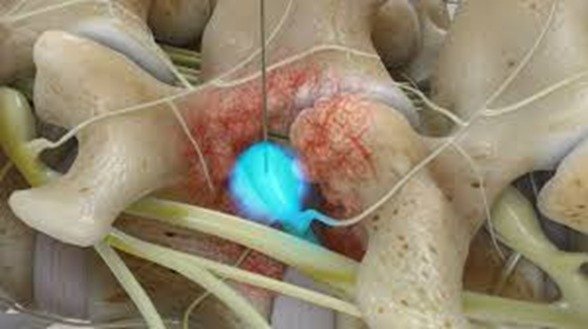
Pulsed Radiofrequency (PRF)
Pulsed radiofrequency (PRF) is a minimally invasive treatment option for post-herpetic neuralgia (PHN) that offers significant pain relief by targeting damaged nerves without causing tissue destruction. PRF delivers short bursts of radiofrequency energy to the affected nerve, disrupting the pain signals responsible for chronic discomfort. This technique reduces inflammation and modulates nerve activity, making it a safe and effective option for patients who experience prolonged PHN pain. PRF is often favored due to its minimal side effects and the potential for long-lasting relief.
Spinal Cord Stimulation (SCS)
Spinal cord stimulation is a technique in which a small device is implanted near the spinal cord to deliver electrical impulses. These impulses modify pain signals before they reach the brain, helping to reduce the sensation of pain. For patients with chronic PHN, SCS can be a life-changing option, offering relief from persistent pain.
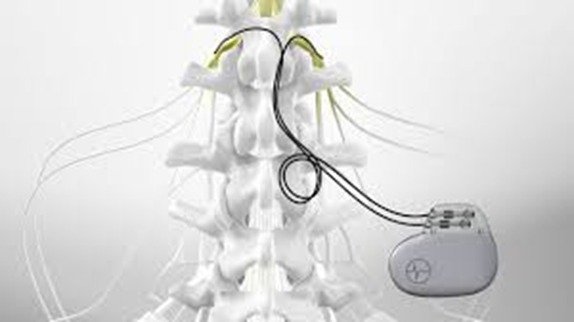
Epidural Injections
Medication Options for Post-Herpetic Neuralgia
Medications can also play a crucial role in managing PHN pain. Depending on the severity of the symptoms, a combination of the following medications may be recommended:
Antiviral drugs: Early treatment with antivirals during shingles can reduce the risk of developing PHN.
Pain relievers: Over-the-counter pain medications, such as acetaminophen or ibuprofen, can help relieve mild pain.
Antidepressants and anticonvulsants: These medications are often prescribed for nerve pain, as they can help modify how the brain perceives pain.
Topical creams and patches: Lidocaine or capsaicin patches may be used to numb the painful area and provide temporary relief.
Self-Care Tips to Manage PHN
While medical treatments are essential, there are also self-care measures that can help patients manage PHN at home. These include:
Keeping the skin cool: Applying cool compresses to the affected area can provide soothing relief.
Wearing loose-fitting clothing: Avoiding tight clothes can reduce irritation of sensitive skin.
Staying active: Gentle physical activity can improve circulation and boost mood, helping to distract from pain.
Living with PHN: Emotional Support
Coping with the emotional toll of chronic pain is just as important as managing the physical symptoms. Many patients with PHN benefit from joining support groups, where they can connect with others who understand their experience. Psychological counseling, cognitive-behavioral therapy (CBT) and mindfulness practices can also help patients develop coping strategies for dealing with chronic pain.
Conclusion
Post-herpetic neuralgia can have a significant impact on a person’s life, but with the right treatment approach, it is possible to manage and alleviate the pain. Mitigate Pain Clinic offers a range of interventional pain management techniques designed to provide relief and improve quality of life for those suffering from PHN. If you or a loved one are dealing with post-herpetic neuralgia, contact Mitigate Pain Clinic today to discuss your treatment options and take the first step toward reclaiming your life from chronic pain.
FAQs about Post-Herpetic Neuralgia (PHN)
Our Treatments
- Joint Pain
- Back Pain
- Sciatica Pain
- Neck Pain
- Hand Pain
- Shoulder Pain
- Foot & Ankle Pain
- Limb Pain
- CRPS Pain
- Cancer Pain
- Headache
- Hyperhidrosis
- Herpes Zoster Pain
- Chronic Pelvic Pain
- Scar Tenderness
- Postherpetic Neuralgia
- Trigeminal Neuralgia
- Peripheral Neuralgia
- Chronic Vascular Pain
- Generalised Body Pain
- Chronic Injury Pain
- Failed Back Surgery Syndrome
- Chronic Post Surgical Pain
- Other Painful Conditions
- Slipped DISC / PIVD